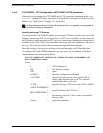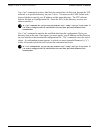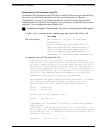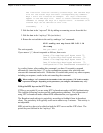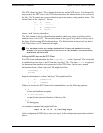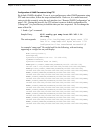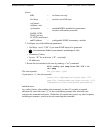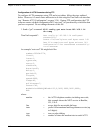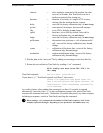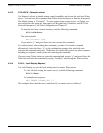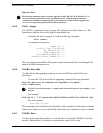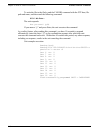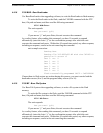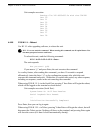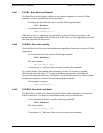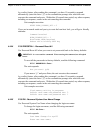
6000-100Ch4.fm Rev. D TimeVault™ User’s Manual 4-75
Extended Function Commands Chapter 4: Serial or Telnet I/O Functions
timeout = after sending a command to the modem, the time
interval, in seconds, that TimeVault waits for a
modem response before timing out
duration = duration, in seconds, of a single ACTS session,
starting after the modem detects a carrier
delay = reserved for factory calibration only; do not change
period = time interval, in minutes, between call attempts
flag = set to ON by default; do not change
speed = baud rate, set to 9600 by default; reserved for
factory calibration only; do not change
fudge = reserved for factory calibration only; do not change
pollcounter = determines time precision vs. risk of unsuccessful
call; reserved for factory calibration only; do not
change
center = calibration of the phone line; reserved for factory
calibration only; do not change
modemInit = modem initialization string; reserved for factory
calibration only; do not change
2. Edit the data in the “acts.conf” file by adding or renaming servers from this list.
3. Return the revised data to TimeVault by sending a “set” command:
F100 config set acts host:192.168.1.14
dir:temp
TimeVault responds:
Are you sure? (y/N)
<CR><LF>
If you answer “y”, TimeVault responds as follows*, then resets:
Source file temp/acts.conf bytes read: 149
Dest File/config/acts.conf bytes written: 149
Configuration files transferred successfully!
*
<CR><LF>
follows each line
As a safety feature, after sending this command, you have 10 seconds to respond
affirmatively (enter the letter “y”) to the confirmation prompt, after which TimeVault
executes the command and resets. Within that 10 second time period, any other response,
including no response, results in TimeVault canceling the command.
When sending a “set” command, the last number in TimeVault’s response (“149” in this
example) represents file length. Depending on your parameters, this number may vary.



